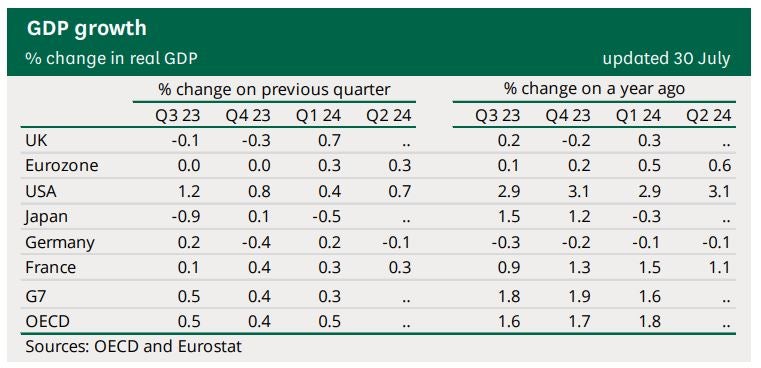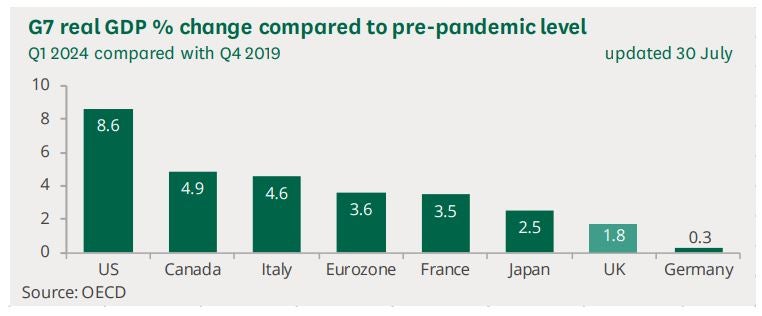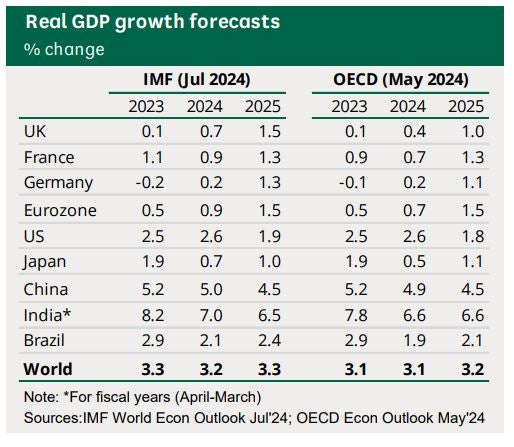
The Labour government’s “national mission” is welcome, but leasing and asset finance industry professionals demand more to realise its potential, writes Jeremy Weltman.
The new Chancellor Rachel Reeves has wasted no time in setting out the Labour government’s strategy to kickstart economic growth, after stating that had the UK economy grown at the OECD average since 2010 it would have been £140 billion larger.
Prime Minister Keir Starmer has indicated that his government is aiming to bolster real terms GDP growth back to around the 2.5% mark that was historically the trend under the Blair and Brown administrations, but which the country has failed so spectacularly on since then. It was not predicted to achieve this under the Conservatives, largely due to a lack of skilled labour and low productivity growth, with GDP growth only peaking at 2% in 2026, according to the latest March projections from the independent Office for Budget Responsibility (OBR).



The government has begun to outline the areas it will focus on, including more housebuilding, green energy projects, and boosting innovation. It wants to adopt a cooperative approach between government and the private sector.
The aim is to ‘crowd-in’ private investment with public spending, without resorting to higher levels of public sector borrowing, or corporation tax, personal income tax, VAT and national insurance. The government plans to stick to the same public debt rule the Conservatives adopted, creating a “fiscal lock” that ensures the OBR assesses public policy, although it would now appear that some taxes will have to rise, probably on capital gains and inheritance.
Well received
Financing experts broadly welcome the government’s commitment to growth. Setting up a new national wealth fund and focusing on private investment are seen to be the right steps towards rebuilding the economy, according to John Phillipou, managing director of Paragon Bank’s SME lending division.
He notes the benefits to the supply chain from large infrastructure projects, noting the overlooked benefit of small ancillary suppliers picking up key work, or backfilling work for main contractors on large projects. This is the key to growth, and invariably it all requires financing.
Simon Goldie, director of advocacy at the Finance & Leasing Association (FLA) also welcomes the government’s approach but acknowledges that there are not enough details available yet to judge its credibility.
Policy certainty and political stability are essential for lenders and their customers, fostering business confidence that was lacking during the politically turbulent years of Brexit, Boris Johnson’s term, and Liz Truss’s brief premiership.
Goldie notes that growth has been elusive “not because firms could not invest, but because they chose not to.” For him, enhancing business sentiment is a crucial first step towards achieving growth.
He also highlights the “knowledge gap” faced by small businesses. Many of these firms are unaware of which finance options are suitable for them, where to obtain finance, and the best way to apply for it.
“We have called for a ‘first-stop-shop’ service for small businesses to address this and produced a ‘match fit for finance’ guide. We would see a lot more growth if we could get a service like the aforementioned first-stop-shop off the ground,” he states.
The plans in detail
A key aspect of the government’s growth strategy is planning reform. An initial step involves loosening the rigid laws blocking building on all types of “green belt” land. The aim is to build 1.5 million new homes by the end of the parliament, with the emphasis on utilising more ‘brown’ and ‘grey’ field areas, with new towns to be developed and new mandatory housing targets introduced for local authorities.
The total number of new homes under these targets will be increased from 300,000 to more than 370,000 per year, with 50% of the usable green belt reserved for affordable homes, although there is no mention of what the consequences would be for missing the targets.
Planning reforms will also assist in major infrastructure projects. With more planning department capacity from hiring local authority planning officers, the aim is to speed up consent. Increased devolution of power in England also aims to increase local control over decision-making to facilitate this, with authorities mandated to formulate new local growth plans.
The new government immediately lifted the ban on onshore wind projects that had been in place since 2015, while also amending planning policy as it applies to wind projects by removing two key policy tests restricting approvals. This aims to double the UK’s onshore wind energy by 2030. Offshore wind will be expanded too by allowing Crown Estate, which controls much of the seabed surrounding UK shores, to borrow more easily.
The government has committed to a new industrial strategy that will assist specific industries with the green transition to achieve its economic growth goals. An Industrial Strategy Council is to be established, with the involvement of business, and it will almost certainly result in subsidies and tax breaks in one form or another, although the government will take time to outline its intentions, so legislation for it was notably absent from the King’s Speech.
Other plans to bolster growth involve reducing trade frictions with the EU, and accelerating electricity grid upgrades. The green energy transition is to be facilitated with a new national energy firm, Great British Energy, and the use of a National Wealth Fund (NWF) that will invest £7.3 billion over the lifetime of the parliament in new gigafactories, port upgrades, carbon capture and storage schemes, hydrogen projects, and steelmaking.
The NWF aims to align the British Business Bank with the UK Infrastructure Bank (UKIB), with UKIB making the initial investments, and it will also own, manage and operate clean power projects that form part of the Green Prosperity Plan to create 650,000 jobs .
It is clear that clean energy is central to Labour’s economic growth agenda, says Julie Henehan, director of corporate development at Shire Leasing, and for her that is both welcome, and indeed crucial to achieving both net-zero carbon emissions and Labour’s goals.
Green technology and solar energy in particular are growing so rapidly that Henehan is very optimistic for market growth. Growth predictions for the solar market that she cites signal 520 GW to 655 GW of solar capacity installed globally per day in 2024, or twice that of 20 years ago. In that respect it is essential that the UK is positioned to benefit both economically and environmentally from this growth.
“In terms of what that means, we need to upskill rapidly to ensure that we have the expertise in place throughout the supply chain to facilitate the adoption of these assets to include manufacture, supply, planning, installation and maintenance,” she says.
Henehan welcomes the idea of GB Energy with the goal of investing billions to create jobs and build supply chains across the country, as well as the creation of 650,000 new jobs by 2030 through the NWF.
Paragon’s Phillipou adds that these bold announcements require a combination of the right people, businesses and stakeholders to deliver. The appointment of Jurgen Maier, the former CEO of Siemens, as head of GB Energy is important in that regard, he notes, as he understands large infrastructure requirements from the private sector point of view. He also welcomes an ambitious homebuilding plan that will boost construction and then private businesses serving the new communities.
“We have worked with many of these businesses in the asset finance sector and we have heard first-hand some of the difficulties they have faced over the past few years,” says Phillipou, adding that these measures should bring a renewed sense of purpose and an ability to get things done.
The FLA’s Goldie is optimistic about the ability of the financing industry to capitalise on the government’s growth agenda. He notes that leasing and hire purchase are “incredibly flexible products” that can be applied across the entire economy – from finance for investing in additional building equipment to the power of leasing in hi-tech environments.
Hoping for more
Goldie says he expects to discuss the government’s plans with ministers and officials soon. He broadly welcomes Labour’s announcement that the government will continue with the full expensing regime, while at the same time urging officials to include leasing.
Why the full expensing extension didn’t go far enough
Phillipou notes there are some loose ends with full expensing which tie in with a more sustainable agenda, where retention and long-life usage of cleaner, greener assets become important. “Widening full expensing to used assets and helping support second-hand markets through financing is on the wish list,” he says.
Meanwhile, the FLA is eager to see the barrier for leasing and rental in the Capital Allowances Act removed. Goldie says that in 2023, “FLA members provided £38 billion in the form of asset finance to businesses, £13 billion of which was leasing, and therefore not eligible for the same level of tax relief that other forms of finance attract.”
He adds that considering the popularity of leasing, its flexibility in different market conditions and its suitability for high-tech environments, its exclusion from the regime distorts finance choice away from what is appropriate.
“That seems like an odd approach for any government that really wants to help businesses thrive,” he says, adding that the FLA is keen to learn more about the new government’s business tax roadmap after having called for this before the election.
Simplification of the tax system would be most welcome, and more details are needed about the government’s plans for the British Business Bank and how it will interact with the National Infrastructure Bank and the NWF.
Goldie mentions that the FLA has been in discussions with government officials about the importance of funding and specifically recognising the role played by non-bank funders to ensure that finance filters out to all corners of the economy.
“To maintain this stream in times of crisis, we would like to see an Emergency Warehouse Finance Liquidity Scheme established.” He also says reform of the Mandatory Bank Referral process is long overdue. “Small businesses need intervention to help them improve their finance applications, rather than a basic referral process that simply shifts a flawed form from one lender to another.”
Phillipou adds that the government could do more to address regulation creep and uncertainty through various agencies, which can impair competition, confuse borrowers and ultimately detract from investment and growth. “Tidying this up has to be a priority for the government. As yet, nothing has really been announced bar the reform of the Consumer Credit Act 1974, but it will take time to deliver,” he says.
Henehan says funders need consistency and speedy decision-making where infrastructure projects are concerned, with adequate capacity and access to the grid to support connections as long lead-in times will slow the adoption of green technologies, and undermine this growth vision.
“At best this delays implementation, but it could result in customers not investing, or reverting to other solutions that are perceived as less difficult and/or time-consuming.”
She says the government’s plans must have defined goals and timelines with the specifics of any financial support available (or made clear if there is none).
“Ideally plans would be consistent across the whole of the UK, not only for simplicity, but also practicality.” She goes on to cite the example of the recent GFI webinar on the deployment of the EV charging infrastructure, when it was noted that England, Wales, Scotland and Northern Ireland have their own strategies.
Still, funders seem generally optimistic concerning the outlook for leasing and asset finance. The government’s policy announcements signal that it is willing to work closely with businesses and support SMEs, and economic forecasts are also broadly more positive.
Laying out such a strategy for a growth-focused economy is crucial, and it must be sustainable too. Funders can capitalise on this with collaboration, and by supporting innovation.
Now all they need are the finer details, for Labour to listen to their recommendations, and for this to act as a solid foundation to build on.
UK General Election 2024: party policies under scrutiny as poll date nears
How a new capital hub is raising €650bn to decarbonise Europe’s cities
Political shift: automotive sector’s expectations from Labour







